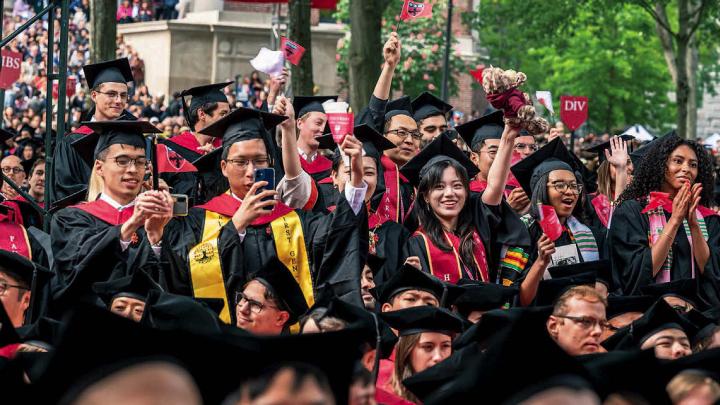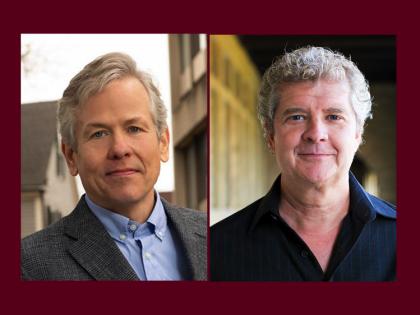Harvard’s 372nd Commencement was perfect. But for a brief shower Wednesday evening, the sun shone throughout the week. Thursday morning, May 25, The Day, was cool enough to lend perfect comfort to the many thousands of people who found themselves clothed in academic gowns. Early and late spring flowers somehow held on simultaneously, making Loeb House—where the governing boards last December elected Claudine Gay, dean of the Faculty of Arts and Sciences, to succeed President Lawrence S. Bacow come July 1—a showcase for New England blooms: perhaps a blessing on the transition.
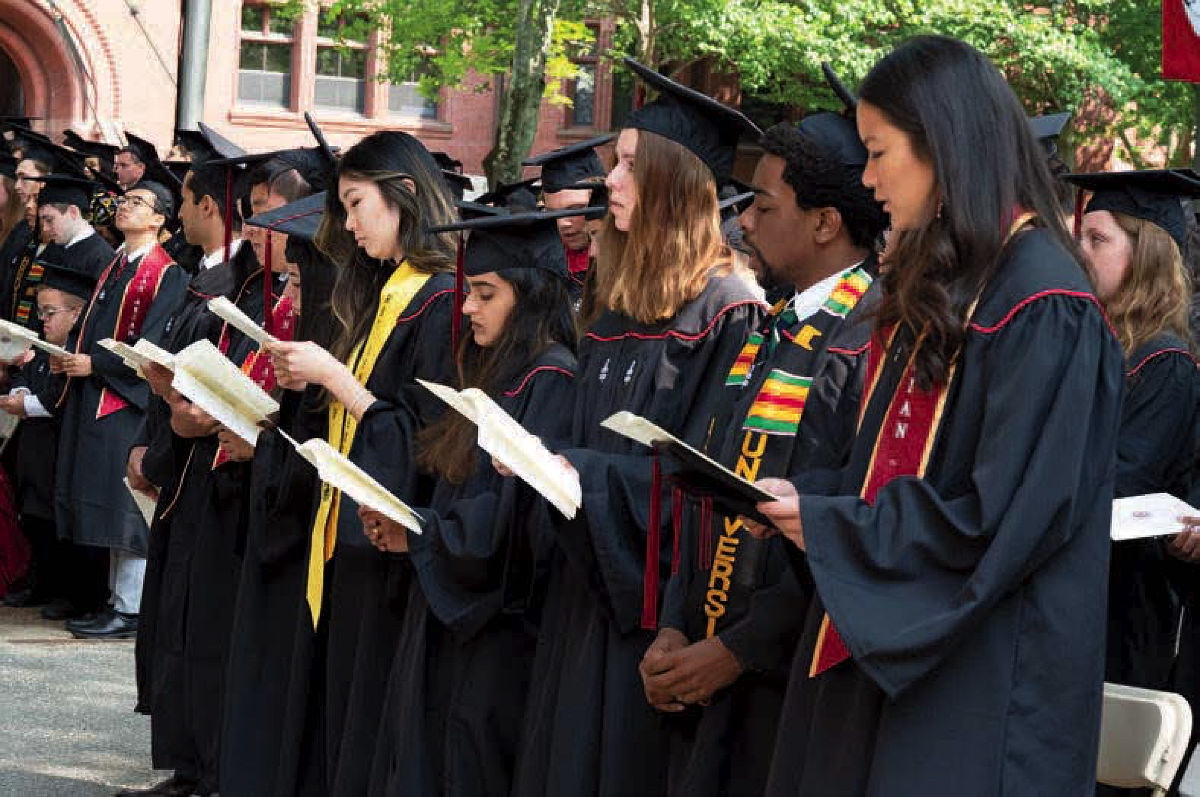
Undergraduates receive baccalaureate wisdom.Photograph by Jim Harrison
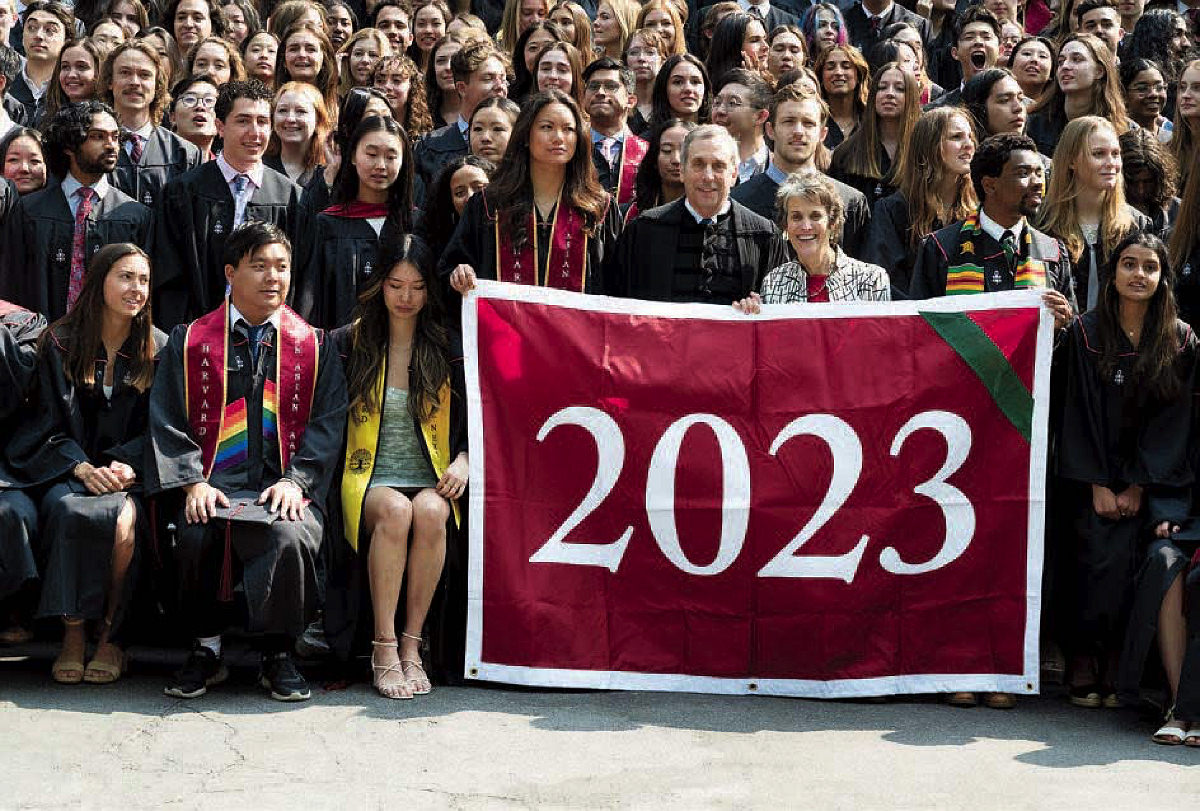
Graduating President Larry Bacow and Adele Fleet Bacow join the seniors' class photo,Photograph by Jim Harrison
And the spirit of the occasion seemed wholly aligned with the magnificent setting. The pandemic’s presence was no longer in the present tense. More than 9,100 students were on hand to graduate: nearly 1,000 more than last year. That reflected learners returning from leaves of absence or activating enrollments deferred during the period of remote learning and social isolation. Honorary degree recipient Katalin Karikó, whose mRNA science provided the key to COVID-19 vaccines that saved millions of lives, received a deserved thunderous ovation (accompanied by tears among some of the newly minted public health professionals). In sum, an all-out celebration of learning and research: that’s an on-mission outcome for fair Harvard in 2023, emerging from a global crisis.
The Commencement exercises are, literally, scripted (conferring degrees is a precise speech act), but people were determined to be themselves this year. Guest speaker Tom Hanks, the acclaimed actor, stage-directed his fellow honorands outside Massachusetts Hall before the procession into Tercentenary Theatre, the better to produce the optimal group photo. Josiah E. Meadows ’23 was a spirited and spiritual Latin Salutatorian, prompting Hanks to bound across the platform to congratulate him and kneel a salute. Senior English orator Pallas Chou ’23, an enzyme wonk, got props, too. And after the Graduate English orator, Vic Hogg, M.P.P. ’23, told a harrowing tale of recovering from being shot (and disclosed that Hanks was their mother’s hero), Hanks bestowed a warm hug—and asked that said mom be pointed out in the crowd.
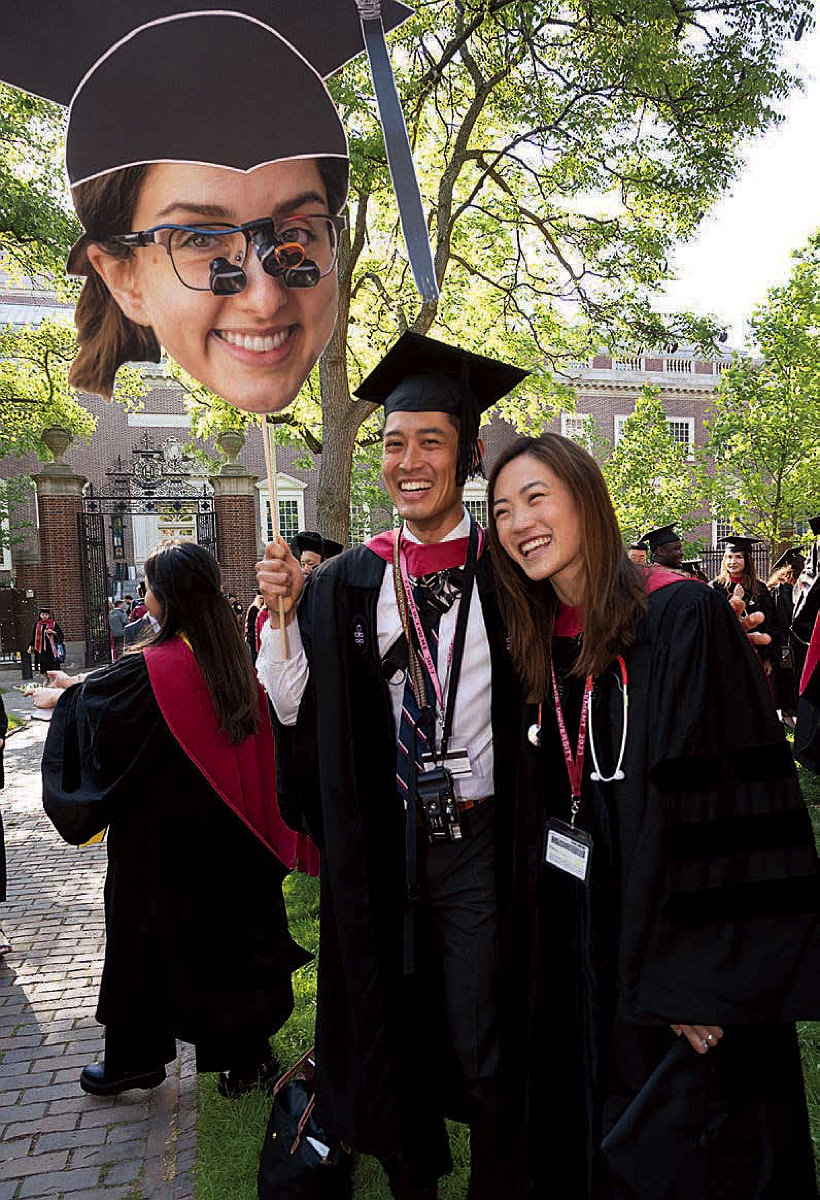
Virtual inclusion: with classmate Madison Hockaday unable to attend Commencement, Christopher Ma, D.D.M ’23, holds her likeness, with Nancy Zhu, D.M.D ’20.
Photograph by Jim Harrison
When it came time to graduate the candidates, Provost Alan M. Garber paused in introducing Gay, “for the final time in this role” as dean “and for the first time on this platform in anticipation of her new role.” She acknowledged the vigorous applause with a quiet “Thank you,” then graciously pivoted to the students and the business at hand: “This is your day, not mine.”
As degrees were conferred, some of the deans, usually a buttoned-down lot, became downright coltish. The Medical School’s George Q. Daley committed the ever-pardonable deviation from his text to shout out his “love and pride” to son Nicholas Edmondson Daley, graduating with the Leverett House contingent. Michelle Williams, concluding her deanship, began her part by proclaiming “I love public health!” (to which Bacow responded, for everyone, “And so do we!”). She lauded “these very loud, very capable, very committed students.” They were loud. Education Dean Bridget Terry Long bowed to the governing boards and, anent a Hanks role, to “Mister Rogers, one of the great educators of our time.” And why not?
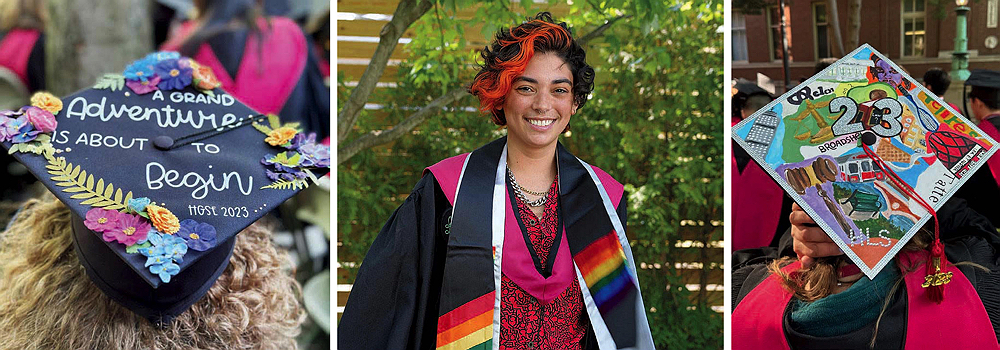
From left: A crafty Graduate School of Education candidate (with impressive hair); Casey Orozco-Poore, M.D. ’23, at the LGBTQ+ affinity celebration; Elana Confino-Pinzon, J.D. ’23, makes lawyering artful.
Left and right photographs by Jennifer Beaumont; middle photograph by Ryan Doan-Nguyen
The six honorands were positively beamish, radiating smiles. Instagrammable fun was in store for the last three. Noting a “doubly special occasion,” the provost led the singing of “Happy Birthday” to historian David Levering Lewis. In a nod to her departure from Hungary in 1985, when her family hid cash inside their daughter’s teddy bear, Karikó received from University Secretary Marc Goodheart her snazzy diploma and a Harvard bear. And Hanks got both a Harvard volleyball (a crucial prop in Cast Away) and a sung tribute, composed and performed by Hasty Pudding students, hilariously playing off the titles of his many works.
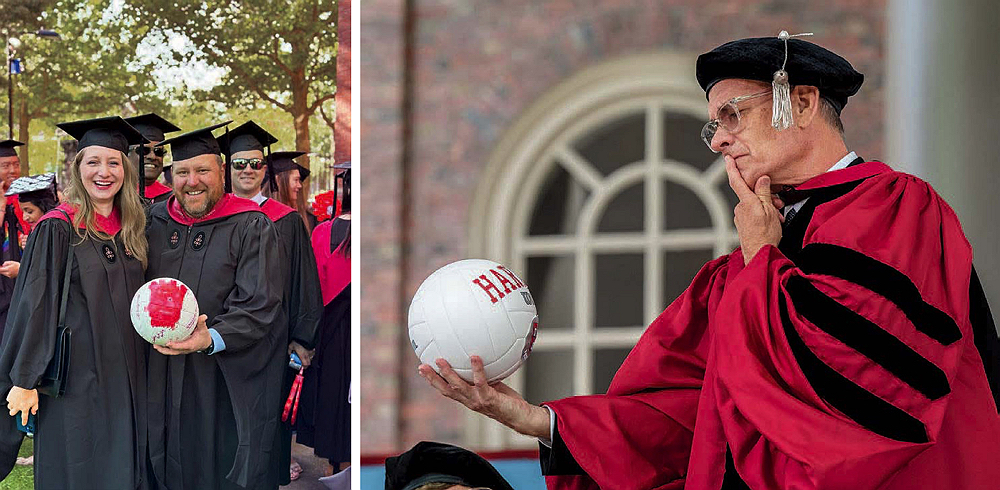
Christina Schweitzer, M.P.H. ’23, and Che Miller, M.H.C.M. ’23, with “Wilson” volleyball honoring Tom Hanks; Doctor Hanks, sending up Aristotle and Homer as he contemplates Harvard’s gift.
Photographs (from left) by Jennifer Beaumont and Jim Harrison
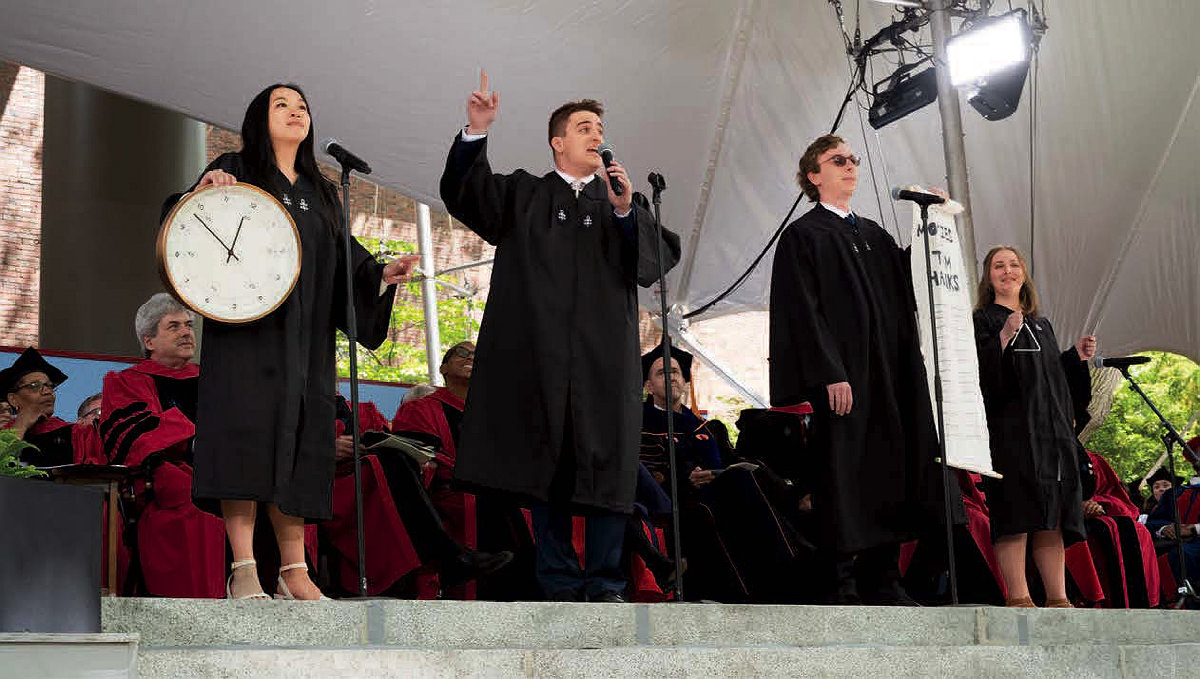
Hasty Pudding performers Odessa Deng ’23, Taylor Kruse ’23, Andrew Van Camp ’23, and Maureen Clare ’24 (not shown, pianist Ian Chan ’23) serenade Tom Hanks.
Photograph by Jim Harrison
Dr. Hanks, who is living proof that one need not acquire a fancy degree to lead a fulfilling, productive life, began amusingly and self-deprecatingly, telling the graduates, “It’s not fair, but please don’t be embittered…without once having walked into that library [gesturing across Tercentenary Theatre to Widener]…I make a damn good living playing someone who did. It’s the way of the world, kids.” He noted further that absent any command of Latin, enzymes, or public policy, “I am the closer for Josiah, Pallas, and Vic.” But he soon turned serious (see page 21).
Garber then acknowledged and warmly thanked “the twenty-ninth president of Harvard University, my extraordinary colleague and good friend, Larry Bacow.”
The president’s brief valedictory remarks befitted the immediate occasion and the impending end of his five-year administration. As they wondered what the future might hold for them, Bacow told the new graduates, “I can relate to that. This is my last Commencement, and I am pondering the same question. Like you, I am contemplating what happens next.” He wished for all of them “what you wish for yourself—and I hope that living a meaningful life is high on your list. What do I mean by that?” Sounding themes he has long emphasized—as an academic leader who remains at heart a teacher—he lauded their hard work, but noted that “you are also extremely fortunate to be sitting here today.” With education and good fortune “comes responsibility, including looking beyond your success to help others.”
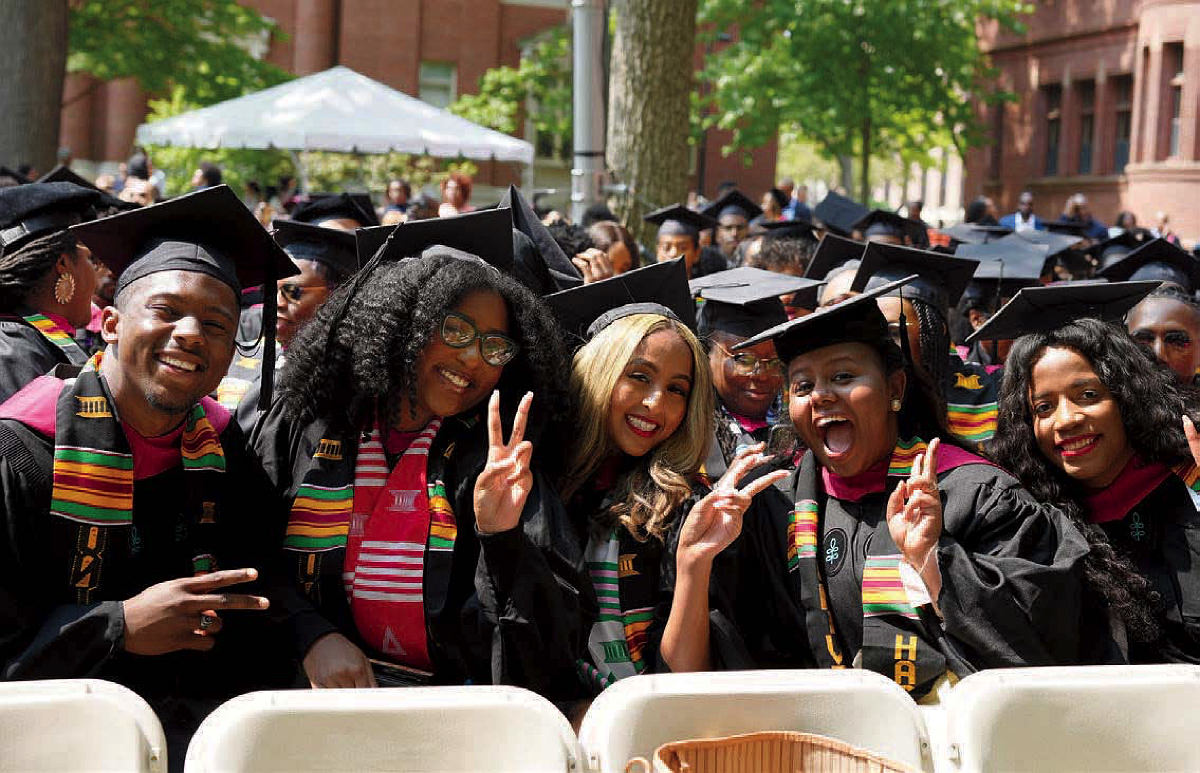
Black affinity celebrants (all M.P.P. ’23) David Lewis, Taylor Jones, Raie Gessesse, Selma Ismail, and Lindsey Batteast.
Photograph by Ryan Doan-Nguyen
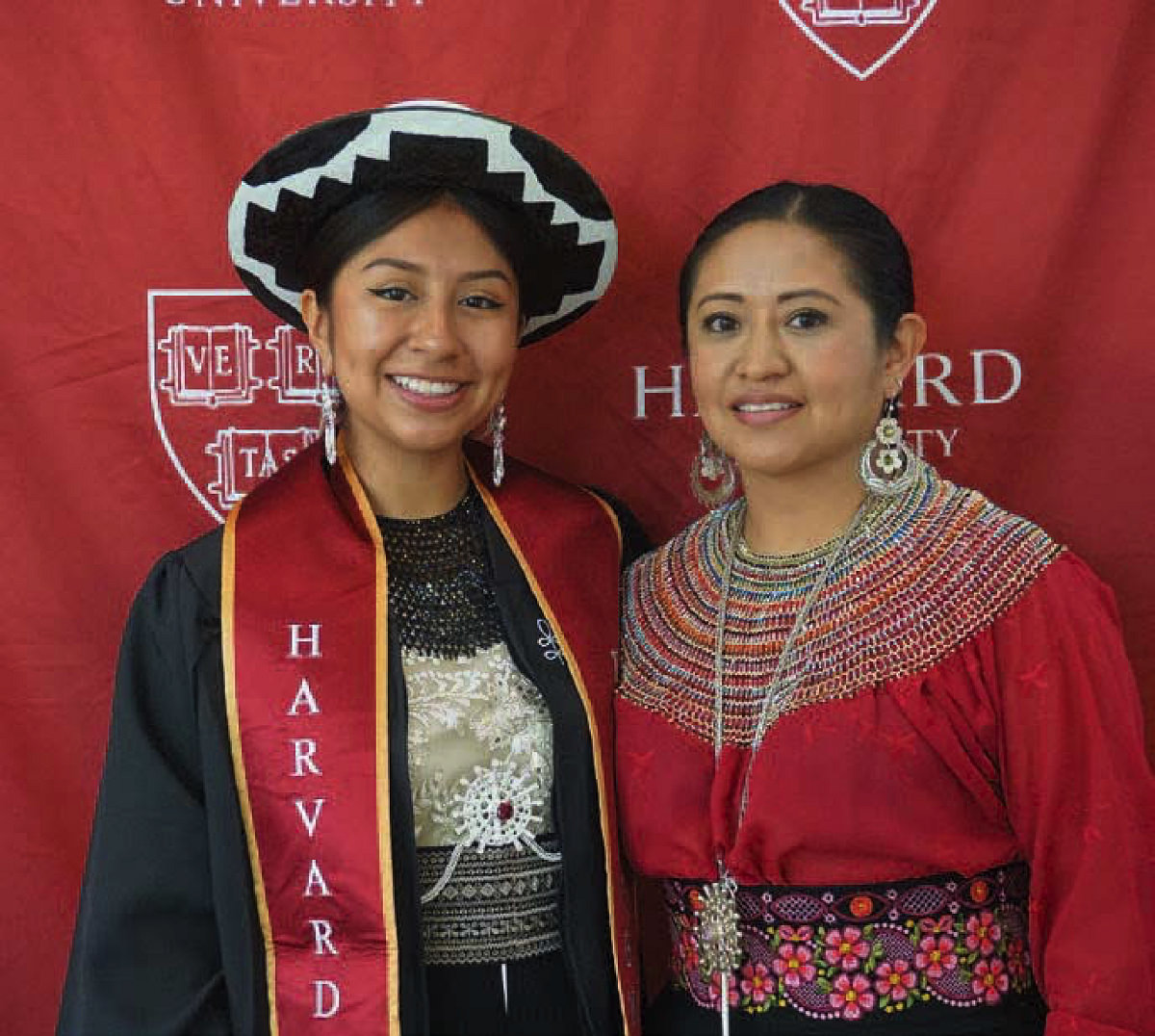
Amy Chalán-Vacacela ’23 with her mother, Maria Elena Vacacela, at the Indigenous affinity celebration
Photograph by Ryan Doan-Nguyen
Reflecting on his life’s path, Bacow continued, “At my Commencement [he is M.P.P.-J.D. ’76, Ph.D. ’78], I never imagined that someday I would be standing here giving the final remarks at your Commencement. I hope…that you will have similarly pleasant surprises.” Thanking all those who had helped him (especially his wife of 48 years, Adele Fleet Bacow), he ended by thanking the class of 2023 “for teaching me so well. I am grateful to each and every one of you for being a constant source of hope and optimism.…I look forward eagerly to celebrating all that you will do for the world—and all whose lives will be made better by your good work.”
A good leader projects hope and optimism, and Bacow has reason to feel that way about how Harvard, despite the pandemic, was strengthened considerably on his watch: intellectually, financially, and in other ways (see page 29). But those sanguine conditions and the bonhomie universally on display within Harvard on May 25 should not delude anyone about challenges facing education at every level: a symptom of wider troubles across the land. Several clear-eyed speakers during the week addressed them directly.
Constraints on and intrusions into public universities have become staples of state legislation and now the U.S. presidential campaign. Taking note, Phi Beta Kappa orator Adam Falk, Ph.D. ’91, president of the Alfred P. Sloan Foundation (and past president of Williams College and arts and sciences dean at Johns Hopkins), on Tuesday bluntly recalled his father’s flight from the Nazi suppression of academic institutions. He said that “the destruction of a society’s political freedoms often starts by targeting the universities. Academia, as an institution, is a bulwark against the idea that the state can decide what is acceptable to say, write, and even think.”
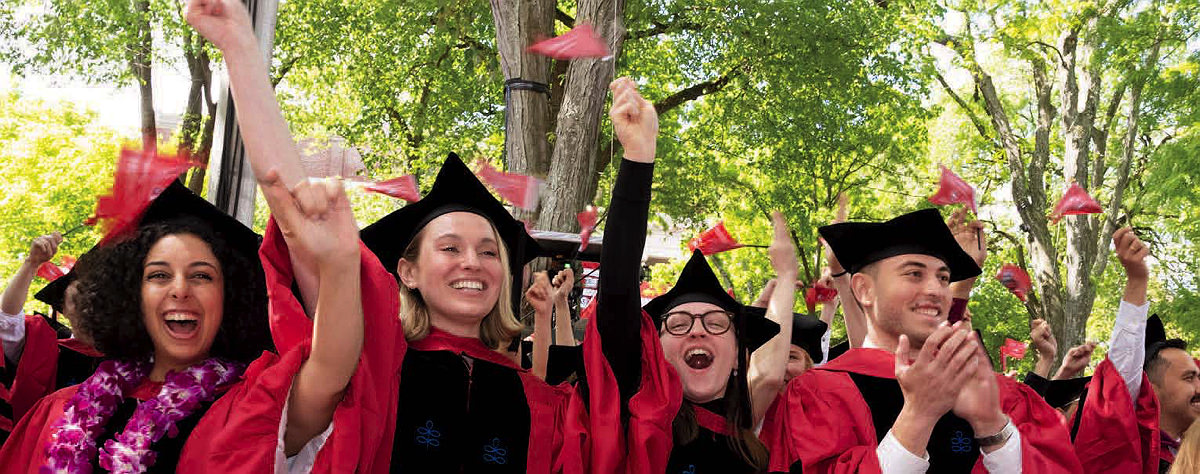
New Ph.D.s Layla Siraj, Sadie Piatt, Chelsea Messinger, and Daniel Greenfield zestfully join the “ancient and universal company of scholars.”
Photograph by Jim Harrison
K-12 schooling was the subject the next day when Graduate School of Education class day speaker Ruth Simmons, Ph.D. ’73, LL.D. ’02 (past president of three colleges and now Harvard’s adviser on engagement with historically black volleges and universities), assailed the “attack on educators.” Backlashes against pandemic closures of K-12 schools and broader cultural confrontations have prompted limits on instruction, book bans, and politicization of school boards. As she put such assaults in the context of her own youth in the Jim Crow South, when there were “calls for permanent enslavement of our minds,” Simmons said, “We have be en here before.”
Hanks himself, riffing on the appeal of superheroes and the enduring value of Truth [Veritas], Justice, and the American Way, declared, “We all are in a cage match, mixed martial arts battle royale with agents of intolerance, ignorance, and braying incompetence, the malevolent equals to Imperial Storm Troopers, Lex Luthor, and Loki.” (Excerpts from these addresses begin here; access full texts and complete Commencement coverage at harvardmag.com/comm-hanks-23.)
In the end, Hanks said, the greatest threat to truth and to ensuring that Americans keep “the promises of our promised land” lies in passivity and withdrawal from the fray: “Indifference makes citizens into indentured servants held in labor by the despots and tyrants….”
In their very different ways, then, two relatable guys, Tom and Larry, agreed on a common point: the responsibility of all—particularly those blessed by education and opportunity—to seek the common good. As Bacow told the graduate throng, “I have never met anyone who thinks the world we live in is perfect. This statement is equally true of liberals and conservatives, Democrats and Republicans…across the political spectrum. So, if you believe this world is imperfect, the only way it will get better is if good people like you work to repair it. This is now your responsibility.”
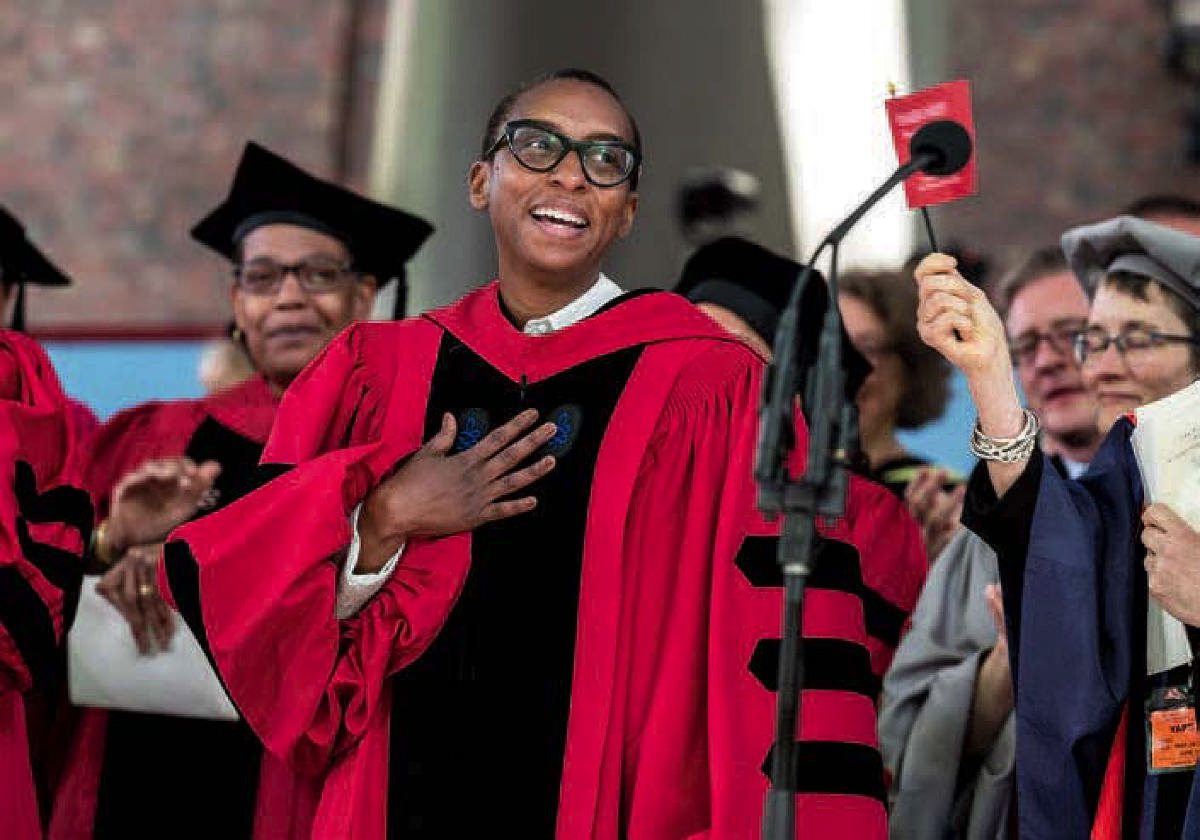
President-elect Claudine Gay
Photograph by Jim Harrison
Within weeks, the University would entrust Claudine Gay with articulating such principles for the Crimson community. She faces an immediate challenge to core values (the Supreme Court decision on the lawsuit against the use of affirmative action in admissions), and others will no doubt follow. But as one administration hands off to the next, she can confidently continue the University’s work knowing from the 372nd Commencement that, at least internally, Harvard’s house and spirits are in good order.
